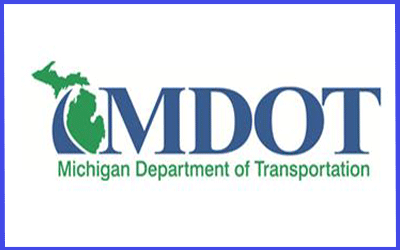
Peters makes his case for Biden infrastructure plan
|

|

|

 |
FOR IMMEDIATE RELEASE
CONTACT: Kim Nowack, Mackinac Bridge Authority, 906-643-7600
Mackinac Bridge enters the busy season for traffic and for maintenance work
May 25, 2021 — As traffic picks up on the Mackinac Bridge for the traditional increase in warmer season travel, so does the work required to maintain this engineering icon.
Contractor Seaway Painting is wrapping up five seasons devoted to stripping and repainting the bridge’s twin ivory towers. At the same time, the Mackinac Bridge Authority’s (MBA) team of dedicated maintenance staff is out on the bridge deck, replacing pieces of the original decking, repairing deck joints, and cleaning off a winter’s worth of grit tracked onto the bridge.
“Like with road work and maintenance anywhere else, the season for taking care of the Mackinac Bridge coincides with the peak of tourism travel in northern Michigan,” said MBA Executive Secretary Kim Nowack. “We realize the views of the Straits of Mackinac are tempting, but we need customers to focus their attention on driving, especially when passing work zones on the bridge.”
Delays for work on the bridge are generally minimal, as most lane closures are removed for holidays and peak traffic periods, but in some cases those lane closures must remain in place even when traffic picks up.
“We’re all in a hurry to get where we’re going, particularly when we’re on vacation, but it’s critically important that drivers slow down and set aside any distractions when they are passing through one of our work zones,” Nowack said. “A moment of inattention could result in a terrible tragedy.”
What typically results in traffic backups at the bridge is the surge of weekend traffic from late spring through fall, particularly from 2 to 6 p.m. on Fridays, and 10 a.m. to 4 p.m. on Sundays. Even with all toll booths open, the sheer volume of traffic sometimes exceeds the capacity of the toll workers. The bridge takes many types of payment now, including cash, credit/debit cards, Apple Pay/Google Pay, and MacPass, which is the fastest transaction type.
“Our toll workers are always doing the best they can to get drivers through the toll booths as quickly as possible,” Nowack said. “We just ask that customers exercise their patience as they approach the booths.”
Live traffic camera views of the bridge, updates on bridge conditions, toll rates, and information on the MacPass program can all be found on the MBA website: www.MackinacBridge.org.

FOR IMMEDIATE RELEASE CONTACT: Dan Weingarten, MDOT Office of Communications, 906-250-4809
Michigan Welcome Centers to reopen for
May 24, 2021 — In accordance with Gov. Gretchen Whitmer and the Michigan Department of Health and Human Services’ May 15, 2021, Gatherings and Face Mask Order, the Michigan Department of Transportation (MDOT) will resume tourist information services at all Michigan Welcome Centers prior to the Memorial Day holiday weekend. MDOT Welcome Center tourism services will resume on May 28, with appropriate safety protocols in place. Gov. Whitmer’s MI Vacc to Normal plan ties loosening coronavirus restrictions to vaccination rates. Since more than 55 percent of eligible Michiganders had received at least one dose by May 10, businesses are allowed to resume in-person work starting May 24. “MDOT Welcome Centers play a key role in highlighting all Michigan has to offer both to in-state and out-of-state travelers,” State Transportation Director Paul Ajegba said. “Our knowledgeable Welcome Center staff have a wealth of Pure Michigan information to help travelers find the destinations, events and activities they’re looking for.” Demand for travel and tourism information is expected to be high over the long Memorial Day weekend. The American Automobile Association (AAA) forecasts more than 1 million Michigan residents will take a trip during the holiday period, a nearly 57 percent increase from last year. Quick and cost-free COVID-19 testing continues to be available at the following high-volume Welcome Centers: Dundee (Monroe County) on northbound US-23, Coldwater (Branch County) on northbound I-69, New Buffalo (Berrien County) on eastbound I-94, and Monroe (Monroe County) on northbound I-75. A map of MDOT Welcome Centers is available online. “Pure Michigan is ready and eager to welcome back visitors and help drive Michigan’s recovery by promoting safe travel across the state,” said Dave Lorenz, vice president of Travel Michigan, part of the Michigan Economic Development Corp. “Our Welcome Centers play a critical role in ensuring a positive ‘first impression’ visitor experience, and the safe reopening of the Welcome Centers is great news for the industry.” Taking proactive steps to mitigate the spread of COVID-19, MDOT closed the information lobbies at the state’s 14 Welcome Centers in March 2020. For travel information, visit www.Michigan.gov/Drive and www.Michigan.org. For current and up-to-date information regarding the Coronavirus, visit http://www.Michigan.gov/ |

|

FOR IMMEDIATE RELEASE WEDNESDAY, MAY 12, 2021
CONTACT: Rob Morosi, MDOT Office of Communications, 248-483-5107, [email protected]
Extensive bridge work requires closing I-75 this weekend in Oakland County and Detroit
Fast facts: – Southbound I-75 will be closed from I-696 to I-94; northbound I-75 will be closed from M-102 (Eight Mile Road) to I-696. – Closures begin at 9 p.m. Friday and end by 5 a.m. Monday. – 13 Mile Road will be closed under I-75 over the weekend.
May 12, 2021 — Weather permitting, bridge demolition, beam setting, and substructure work will require southbound I-75 to be closed in sections from I-696 to I-94, and northbound I-75 to be closed from M-102 (Eight Mile Road) to I-696. These closures will begin at 9 p.m. Friday, May 14, and end by 5 a.m. Monday, May 17. One lane of southbound I-75 will remain open from M-102 to M-8 (Davison Freeway) for local traffic. Further north, 13 Mile Road will be closed under I-75 to allow crews to safely set new bridges beams on the bridge that carries southbound I-75 over 13 Mile Road. The closure, between Molly and Concord drives, starts at 9 p.m. Friday, May 14, and ends by 5 a.m. Monday, May 17. During the closure, traffic will be detoured to 12 Mile Road. Prior to the freeway closure, crews will begin closing ramps at 7 p.m. and start freeway lane closures at 8 p.m. All ramps to northbound I-75 will be closed from Davison Freeway to 9 Mile Road. All ramps to southbound I-75 will be closed from 14 Mile to 9 Mile Road in Oakland County. In Detroit, ramps to southbound I-75 will be closed from 7 Mile Road to Clay Street. During the closure, northbound I-75 traffic will be detoured west on 8 Mile Road to northbound M-1 (Woodward Avenue), then eastbound I-696 back to northbound I-75. Southbound I-75 through-traffic will take westbound I-696 to southbound M-1, then westbound M-8 (Davison Freeway) to southbound M-10 (Lodge Freeway) to get back to southbound I-75. “Working with three separate contractors to align all this work into one weekend to minimize the impact on the motoring public requires extensive coordination,” said Metro Region Engineer Kimberly Webb. “This direction benefits the public by limiting the number of times a freeway needs to close and provides a safer environment for both workers and drivers.” |